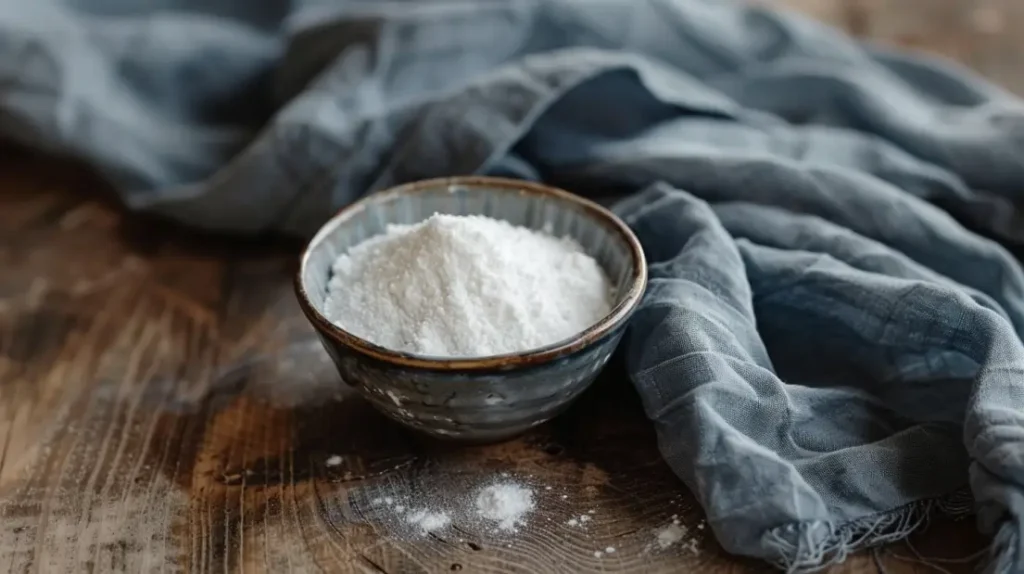Ever spilled coffee on your favorite shirt and wondered if there’s a quick fix in your kitchen? Baking powder might just be the unexpected hero you need. This common household item isn’t just for making your cakes rise; it has surprising stain-fighting powers too.
Key Takeaways
- Baking Powder Composition: Baking powder contains sodium bicarbonate, acidic salts, and starch, which contribute to its effectiveness in removing stains.
- Stain Removal Mechanism: The combination of sodium bicarbonate and acids in baking powder creates a mild abrasive that helps break down and lift stains.
- Comparison to Conventional Cleaners: Unlike conventional stain removers that may contain harsh chemicals, baking powder is non-toxic, eco-friendly, and cost-effective.
- Practical Applications: Baking powder can be used to remove stains from fabrics and clean hard surfaces like countertops, stovetops, and refrigerators.
- Pros and Cons: While baking powder is versatile and safe for various cleaning tasks, it might not be as effective on stubborn stains and may require more physical effort and time to achieve results.
The Science of Baking Powder as a Cleaning Agent
Baking powder isn’t just for baking—it also has properties that make it effective for removing stains around the house.
How Baking Powder Reacts with Stains
Baking powder contains sodium bicarbonate and acidic salts. When these components mix with water, they form a mild abrasive that helps lift stains. Sodium bicarbonate breaks down into sodium ions and bicarbonate ions. These ions react with some stain molecules, breaking them into smaller parts that water can rinse away. For example, if you sprinkle baking powder on a coffee stain, it helps break down the tannins that cause the stain, making it easier to lift from the fabric.
Comparing Baking Powder to Conventional Stain Removers
Baking powder offers several advantages over traditional stain removers. It’s non-toxic, making it a safer option for homes with kids or pets. In many cases, it’s also more affordable. Conventional stain removers often use harsh chemicals like bleach or ammonia, which can damage fabrics or surfaces. However, while baking powder works well on many common stains like coffee or tea, it might not be as effective on stubborn stains like ink or grease, where stronger chemical agents are generally more successful.
By understanding how baking powder works and its benefits compared to conventional cleaners, you can more effectively utilize it for stain removal around your home.
Practical Uses of Baking Powder in Stain Removal
Baking powder isn’t just for baking; it also serves as a versatile stain remover. Its components work together to tackle a variety of stains on multiple surfaces.
Removing Stains from Fabrics
Baking powder can lift stains from fabrics without damaging the material. Here’s how to use it:
- Pre-treating Stains: Mix a tablespoon of baking powder with water to form a paste. Apply the paste to the stain, let it sit for 15 minutes, then launder as usual.
- White Clothes: For stubborn stains on white clothes, combine baking powder with hydrogen peroxide. Apply the mixture and let it sit for 10 minutes before washing.
- Odor Removal: Add half a cup of baking powder to your laundry load to neutralize odors from your clothing.
Cleaning Hard Surfaces and Appliances
Baking powder’s mild abrasiveness makes it effective for cleaning various hard surfaces and appliances:
- Countertops: Sprinkle baking powder on a damp sponge and scrub the surface. Rinse with water for a clean, stain-free countertop.
- Stovetops and Ovens: Create a baking powder paste with water, spread it on stubborn stains, and scrub using a sponge or cloth. Wipe clean with a damp cloth.
- Refrigerators: Combat bad odors and stains by sprinkling baking powder on a damp cloth and wiping down the interior surfaces. Rinse with water.
- Microwaves: Place a bowl of water with a tablespoon of baking powder inside the microwave. Heat for 2-3 minutes, then wipe away loosened food particles.
Baking powder provides an effective, non-toxic solution for various stain removal and cleaning tasks around the house.
Pros and Cons of Using Baking Powder for Stains
Baking powder isn’t just for baking; it can also help remove stains. Let’s explore the benefits and drawbacks of using baking powder for this purpose.
Advantages of Using Baking Powder
- Non-toxic Cleaning Agent
Baking powder is non-toxic and safe for use around pets and children. This makes it an excellent choice for those looking for a safer alternative to harsh chemical cleaners. - Versatile Cleaning Applications
It can clean a variety of stains, from fabric to hard surfaces. For example, you can use it to pre-treat a coffee stain on your shirt and also to scrub your stovetop. - Eco-friendly Product
Baking powder is environmentally friendly. It decomposes naturally, reducing the impact on the environment compared to chemical-based cleaners. - Cost-effective Solution
It’s inexpensive and widely available. A small amount of baking powder can often replace several different specialized cleaning products, saving you money. - Mild Abrasive Properties
Its mild abrasiveness aids in cleaning without scratching surfaces. For instance, use it to clean ceramic tiles or countertops without worrying about damage.
- Limited Stain Removal Effectiveness
Baking powder may not be effective on all types of stains. For example, it struggles with very tough stains like ink or oil, requiring a stronger cleaner. - Need for Physical Effort
You often need to scrub when using baking powder for cleaning. This can be physically demanding, especially for larger surfaces or tough stains. - Not Suitable for All Materials
It’s not ideal for certain delicate fabrics or surfaces. For instance, using baking powder on silk or polished wood can potentially cause damage. - Residue Risk
If not rinsed thoroughly, baking powder can leave a residue. This might require extra rinsing steps to remove any remaining powder, especially when used on fabrics. - Slow Acting
Baking powder works slower compared to specialized stain removers. You might need to leave it on the stain for an extended period, which could be inconvenient.
Understanding these pros and cons can help you decide when and how to use baking powder for stain removal, balancing its benefits against its limitations.
Conclusion
Baking powder can be a handy tool in your cleaning arsenal. Its non-toxic nature and versatility make it a great choice for eco-friendly stain removal. While it may not tackle the toughest stains or work quickly, its cost-effectiveness and gentle abrasiveness are definite perks. Just remember to consider its limitations and test it on a small area first. With a bit of effort, you might find baking powder to be a surprisingly effective cleaner for various household tasks.
Frequently Asked Questions
What makes baking powder effective for stain removal?
Baking powder’s effectiveness in stain removal lies in its mild abrasiveness and alkaline nature. The baking soda in baking powder can break down and loosen stains, making it easier to scrub them away without damaging surfaces.
How do you use baking powder to remove stains from fabrics?
To remove fabric stains, sprinkle baking powder directly on the stain, let it sit for 15-30 minutes, then scrub gently with a brush or cloth. Finally, wash the fabric as usual to remove any residue.
Can baking powder clean hard surfaces?
Yes, baking powder can clean hard surfaces. Mix it with water to form a paste, apply it to the surface, scrub with a sponge or brush, and rinse with water. It works well for sinks, countertops, and tiles.
What are the pros of using baking powder for stain removal?
The pros include its non-toxic nature, versatility, eco-friendliness, cost-effectiveness, and mild abrasive properties. It’s a safe and natural alternative to harsher chemical cleaners.
Are there any limitations to using baking powder for stains?
Yes, baking powder may be less effective on tough stains and doesn’t work well on certain materials. It often requires more physical effort for scrubbing and may leave residue if not thoroughly rinsed. Additionally, it acts slower than specialized cleaners.
Is baking powder safe for all fabric types?
Baking powder is safe for most fabrics, but it’s always best to perform a spot test on an inconspicuous area first. Some delicate or specialty fabrics may react differently, so proceed with caution.
How cost-effective is baking powder compared to specialized cleaners?
Baking powder is generally more cost-effective than specialized cleaners. A small amount goes a long way, reducing the need for multiple cleaning products and making it an economical choice for various cleaning tasks.



